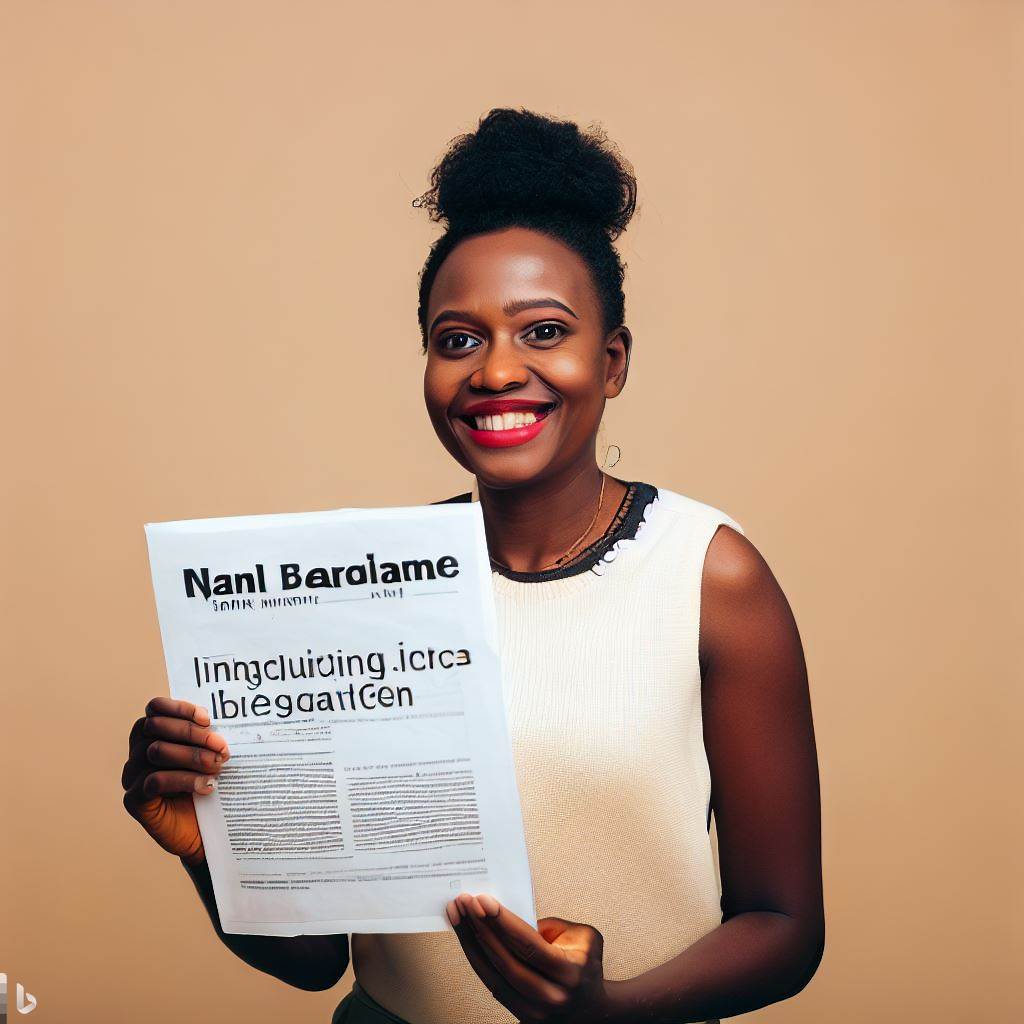Definition and Basic Concepts of Insurance in the Nigerian Context
Understanding Insurance
Insurance provides financial protection against unexpected risks.
It acts as a safety net for individuals and businesses in Nigeria.
People pay premiums to insurance companies in exchange for coverage.
These payments help cover losses related to accidents, illnesses, or damages.
Thus, insurance reduces financial uncertainty in everyday life.
Key Types of Insurance Commonly Used
Nigerians often rely on life, health, property, and auto insurance.
Life insurance supports families by providing a payout after a policyholder’s death.
Health insurance covers medical expenses, making healthcare more affordable.
Property insurance safeguards homes and businesses against risks like fire or theft.
Auto insurance offers protection for vehicle damages or liability arising from accidents.
How Insurance Works in Nigeria
Insurance companies assess risks before selling policies to customers.
They calculate premiums based on the likelihood and potential cost of a claim.
Policyholders receive contracts detailing covered risks and terms.
In case of an insured event, they file claims to get compensated.
The Nigerian Insurers Association regulates these processes to protect consumers.
Your Personalized Financial Plan
Get expert financial advice tailored exclusively to your goals. Receive a custom roadmap in just 1-3 business days.
Get StartedEconomic Significance of Insurance in Nigeria
Insurance supports economic stability by mitigating losses for individuals and firms.
It encourages investment by reducing financial risks in businesses.
Furthermore, insurance companies create jobs and contribute to government revenues.
Many Nigerians now recognize insurance as essential for personal and commercial security.
Consequently, the insurance sector continues to grow amid increased awareness and regulation.
Historical Development of the Insurance Industry in Nigeria
Early Beginnings and Colonial Influence
The insurance industry in Nigeria began during the colonial era in the early 20th century.
British insurance companies played a significant role in introducing various insurance products.
Consequently, local Nigerians gradually became aware of insurance as a financial safety tool.
At first, the market focused mainly on marine and fire insurance due to trade activities.
However, limited public understanding and infrastructure constrained widespread adoption.
Post-Independence Expansion
After Nigeria gained independence in 1960, the insurance sector began to expand rapidly.
Many indigenous insurance companies emerged to meet domestic demands.
Moreover, the government introduced regulations to ensure industry stability and consumer protection.
Key firms such as Continental Assurance and Allied National Insurance grew during this period.
Unlock a Debt-Free Future with Our Unique Strategies
Imagine a life unburdened by debt—a reality we help you visualize and achieve. We offer personalized strategies tailored to your unique situation, guiding you step-by-step toward financial freedom.
Start TodayThe government also established the National Insurance Corporation to boost public confidence.
Regulatory Advances and Industry Growth
In the 1980s, the Nigerian government implemented stricter insurance regulations.
This led to the creation of the National Insurance Commission (NAICOM) to oversee the sector.
Furthermore, NAICOM improved transparency and enforced solvency requirements for insurers.
These changes encouraged new entrants and diversified insurance products, including life and health coverage.
Consequently, more Nigerians began recognizing insurance as a valuable financial tool.
Modern Developments and Technological Innovations
Today, the Nigerian insurance industry embraces technology to reach a broader market.
Mobile platforms enable easier access to insurance products across urban and rural areas.
Insurance providers like Zenith Assurance and Heritage General now offer digital services.
Additionally, microinsurance has gained popularity to serve low-income populations.
As a result, the industry continues to grow steadily, contributing to Nigeria’s economic resilience.
Types of Insurance Policies Commonly Used by Nigerians
Health Insurance
Health insurance protects individuals from high medical costs.
Many Nigerians opt for health coverage through companies like MediTrust Nigeria.
It offers access to quality healthcare without financial burden.
Unlock Untapped Nigerian Wealth with Our Expert Advice
Imagine accessing investment opportunities others overlook—stocks, bonds, real estate, small businesses tailored to you. We offer personalized advice you won't find elsewhere, guiding you to financial success.
Unlock WealthAdditionally, health plans often cover hospitalization and outpatient services.
Consequently, policyholders experience peace of mind during health emergencies.
Life Insurance
Life insurance provides financial security to families after loss of a breadwinner.
Companies such as Evergreen Assurance offer popular life insurance plans.
These policies pay a lump sum or periodic benefits upon the policyholder’s death.
Moreover, some plans include savings and investment components.
Therefore, many Nigerians see life insurance as a long-term financial strategy.
Property Insurance
Property insurance safeguards homes and businesses from damage or theft.
Firms like Guardian General provide property insurance tailored to Nigerian environments.
It covers risks such as fire, flooding, and burglary.
Furthermore, property owners gain confidence to invest in growth without worry.
As a result, property insurance is crucial for asset protection.
Motor Insurance
Vehicle owners in Nigeria are required to have motor insurance by law.
Companies like Continental Reinsurance offer comprehensive motor insurance packages.
This insurance covers accidents, theft, and third-party liabilities.
Besides legal compliance, motor insurance ensures financial recovery after incidents.
Thus, it remains one of the most widely purchased policies nationwide.
Travel Insurance
Travel insurance covers risks such as medical emergencies and lost luggage abroad.
Providers like Safeguard International cater to Nigerians traveling overseas.
It also includes trip cancellations and flight delays protection.
Consequently, travelers feel more secure when exploring new destinations.
Hence, travel insurance is becoming increasingly popular in Nigeria.
Microinsurance for Informal Sector
Microinsurance offers affordable insurance options for low-income Nigerians.
Organizations such as TrustShield Microinsurance focus on small-scale coverage.
It targets farmers, traders, and artisans with tailored, low-premium products.
Moreover, it enables financial inclusion and reduces vulnerability to risks.
Therefore, microinsurance plays a vital role in Nigeria’s economic development.
Explore Further: Why Life Insurance Is a Must for Every Nigerian Breadwinner
The Role of Insurance in Protecting Nigerian Families Against Financial Risks
Providing Financial Security in Uncertain Times
Insurance offers Nigerian families a vital source of financial security.
It helps cover unexpected expenses from accidents, illnesses, or natural disasters.
Consequently, families avoid depleting their savings during difficult periods.
For example, health insurance supports medical bills, reducing financial strain on households.
Moreover, life insurance ensures loved ones maintain financial stability after a breadwinner’s death.
Therefore, insurance acts as a safety net that prevents economic hardship.
Supporting Long-Term Family Stability
Insurance policies help families plan for the future with greater confidence.
They enable parents to secure funds for their children’s education and upbringing.
Additionally, insurance protects family assets such as homes, vehicles, and businesses.
Through this protection, families can preserve their wealth against unforeseen losses.
As a result, insurance contributes to generational wealth transfer and economic growth.
Hence, it forms the foundation for lasting family stability in Nigeria.
Encouraging Responsible Financial Planning
Insurance encourages Nigerian families to adopt responsible financial habits.
It fosters awareness about risk management and savings importance.
Furthermore, insurance companies like Heritage Life and SecureTrust Assurance provide educational resources.
These resources guide families in selecting appropriate coverage tailored to their needs.
Consequently, insured families enjoy peace of mind knowing they are prepared for emergencies.
Thus, insurance contributes to financial discipline and resilience nationwide.
Common Types of Insurance Used by Nigerian Families
- Life Insurance: Secures income and supports dependents after a policyholder’s death.
- Health Insurance: Covers medical expenses and hospital bills during illness or injury.
- Property Insurance: Protects homes and valuables against damage or theft.
- Automobile Insurance: Provides coverage for vehicle-related accidents and liabilities.
By combining these insurance types, families create comprehensive financial safety nets.
You Might Also Like: The Essential Insurance Checklist for Nigerian Families in 2024 & 2025
How Insurance Contributes to Economic Stability and Growth in Nigeria
Strengthening Financial Security
Insurance firms in Nigeria offer financial protection to individuals and businesses.
This protection cushions them against unexpected losses such as accidents or disasters.
For instance, Lekki-based PrimeShield Insurance covers property and health risks.
Consequently, insured entities experience less financial disruption during crises.
This stability allows businesses to focus on growth instead of risk mitigation.
Encouraging Entrepreneurial Activities
Insurance reduces the uncertainty that discourages new ventures in Nigeria.
Entrepreneurs feel more confident knowing they have coverage for major risks.
For example, Abuja’s Summit Risk Solutions provides specialized policies for startups.
Therefore, insurance fosters innovation and job creation across various sectors.
Many Nigerian SMEs expand thanks to this added layer of security.
Mobilizing Long-Term Capital
Insurance companies collect premiums from millions of Nigerians regularly.
They invest these funds in government bonds, infrastructure, and development projects.
West African Assurance is known for financing road and energy projects in Kaduna.
Thus, insurance contributes significantly to national economic development.
These investments generate employment and improve Nigeria’s economic landscape.
Reducing the Burden on Government Resources
With widespread insurance coverage, individuals rely less on public welfare.
Insurance claims help cover medical expenses and property damages directly.
For example, Nigerian Trust Insurance assists families affected by floods and fires.
This situation frees government funds for other critical sectors like education.
Hence, insurance strengthens public financial management and societal resilience.
Supporting Sustainable Economic Growth
Insurance supports agriculture, manufacturing, and services by managing risks.
Farmers benefit from crop insurance offered by Plateau State Insurance in Jos.
Manufacturers secure machinery and goods through policies from Cross River Assurance.
With risk minimized, these sectors grow steadily and contribute to GDP.
Ultimately, insurance plays an essential role in Nigeria’s sustainable economy.
Find Out More: The Role of Health Insurance in Protecting Nigerian Families
Challenges and Misconceptions about Insurance among Nigerians
Lack of Trust in Insurance Providers
Many Nigerians distrust insurance companies due to past experiences.
They also distrust insurance companies because of rumors.
Some believe claims take too long to process.
Additionally, stories about denied claims circulate widely.
These stories increase skepticism about insurance.
Consequently, distrust discourages people from buying policies.
However, companies like Zenith Assurance strive to improve transparency.
Heritage Risk Management also works to be more transparent.
Low Awareness and Understanding
Many Nigerians have limited knowledge about insurance benefits.
People often confuse insurance with savings or investments.
Technical jargon makes insurance products seem complicated.
As a result, few actively seek coverage or consult experts.
Educational efforts by firms like Faithful Mutual help reduce ignorance.
Unity Life also promotes better insurance understanding.
Affordability and Economic Constraints
High premiums often deter low-income families from buying insurance.
Many Nigerians prioritize immediate needs over future security.
Inconsistent income streams make regular payments difficult.
Therefore, insurance is sometimes viewed as a luxury.
It is not always seen as a necessity in Nigeria.
Innovative micro-insurance products by Safemax Insurance help bridge this gap.
Misconceptions about Insurance Coverage
Some Nigerians wrongly believe policies offer full coverage for all risks.
Misunderstandings about exclusions lead to disappointment during claims.
Others think payouts are automatic and need no documentation.
These misconceptions create unrealistic expectations.
They also fuel dissatisfaction among policyholders.
Insurance advisors like Olajide Ayorinde emphasize clear communication.
They stress the importance of policy clarification.
Cultural and Social Influences
Traditional beliefs sometimes discourage reliance on insurance.
Some view insurance as tempting fate or showing lack of faith.
Community opinions heavily influence individual decisions about insurance.
Respected leaders like Mrs. Olufunke Okoro promote insurance awareness.
Gradually, cultural acceptance improves in urban and rural areas alike.
Discover More: The Connection Between Risk Management and Insurance Success

Government Policies Shaping the Nigerian Insurance Sector
Regulatory Framework and Supervisory Bodies
The National Insurance Commission (NAICOM) oversees the Nigerian insurance industry.
It enforces guidelines to safeguard policyholders’ interests effectively.
Moreover, NAICOM ensures compliance with insurance laws across all companies.
It regularly updates policies to address emerging market challenges.
Besides NAICOM, the Central Bank of Nigeria influences insurance through financial sector regulation.
These bodies collaborate to maintain sector stability and consumer protection.
Insurance Act and Legal Provisions
The Insurance Act of Nigeria governs insurance operations and licensing.
This law mandates proper conduct by insurance companies and agents.
It also establishes solvency requirements to promote financial health.
In addition, the Act defines penalties for fraudulent or unethical behavior.
Recent amendments reflect global standards and local market dynamics.
Government Initiatives to Boost Insurance Penetration
The Nigerian government promotes insurance awareness and accessibility nationwide.
Initiatives include subsidized premiums for small businesses and farmers.
Also, public-private partnerships support development of microinsurance products.
These measures aim to include underserved populations in risk protection.
They ultimately contribute to economic growth and individual security.
Taxation and Incentives Related to Insurance
Tax incentives encourage individuals and companies to invest in insurance.
For instance, certain premiums qualify for tax deductions under Nigerian law.
Furthermore, exemptions apply to some long-term life insurance policies.
The government also monitors fiscal policies to balance revenue and market growth.
These fiscal tools help attract both domestic and foreign insurance investments.
Consumer Protection and Policyholder Rights
The government enforces strict rules on transparency in insurance contracts.
NAICOM provides a complaint resolution mechanism for dissatisfied policyholders.
It requires clear disclosure of terms, coverage, and exclusions in policies.
Additionally, policyholders benefit from financial stability safeguards of insurers.
This framework builds public trust in insurance offerings across Nigeria.
Impact of International Agreements and Collaboration
Nigeria participates in regional insurance bodies like the ECOWAS Insurance Committee.
This cooperation harmonizes regulations and promotes cross-border insurance services.
Additionally, international standards influence local regulatory reforms.
Such collaborations open access to global reinsurance and capital markets.
Consequently, Nigerian insurers improve product quality and resilience.
Steps to Choose the Right Insurance Plan for Individuals and Businesses in Nigeria
Assess Your Needs
Begin by identifying the specific risks you face in your personal or business life.
Consider your financial obligations and how insurance can protect them.
Evaluate the value of your assets and potential liabilities carefully.
Next, determine whether you need coverage for health, property, life, or business interruptions.
Additionally, think about your future plans and any changes that may affect your insurance needs.
Research Available Insurance Options
Start by investigating different insurance providers operating in Nigeria.
Compare the range of plans, coverage, and benefits they offer.
Look for credible companies like Heritage Assurance and Leadway Assurance.
Furthermore, read customer reviews to gauge their service quality and claim settlement ratios.
Check the financial stability of insurers through ratings from agencies such as NSE or NAICOM.
Understand Policy Terms and Conditions
Carefully read the terms and conditions of each insurance policy.
Focus on coverage limits, exclusions, premiums, and claim procedures.
Be aware of waiting periods and renewal policies for different insurance types.
Moreover, clarify any ambiguous clauses with the insurer or a qualified broker.
This step helps avoid surprises when making a claim in the future.
Evaluate Premium Costs and Affordability
Calculate the total cost of premiums and any additional fees involved.
Balance affordability with the level of coverage provided by the plan.
Remember that the cheapest plan may not offer adequate protection.
Consider flexible payment options that some insurers provide to ease the financial burden.
Also, seek discounts if you bundle multiple insurance policies together.
Consult Insurance Experts and Obtain Quotes
Engage with professional insurance brokers or consultants in Nigeria.
They can provide tailored advice based on your specific circumstances.
Request detailed quotes from several providers for comparison purposes.
In addition, ask for explanations about complex terms and claim processes.
Expert guidance ensures you make a well-informed insurance decision.
Review Claim Support and Customer Service
Investigate the claims process efficiency of the insurance company.
Look for insurers with prompt and fair claim settlements.
Check if the company provides 24/7 customer support for emergencies.
Read testimonials related to customer satisfaction and responsiveness.
Strong customer service builds trust and eases future claim experiences.
Complete the Process to Purchase the Insurance Plan
Once confident, complete the application accurately without omissions.
Submit all required documents such as identification and proof of assets.
Keep copies of your policy documents and receipts safely for future reference.
Set reminders for premium payments to avoid policy lapses.
Finally, regularly review and update your insurance coverage as circumstances change.
The impact of cultural beliefs on insurance adoption in Nigerian society
Traditional Perspectives and Their Influence
Many Nigerians view insurance through the lens of traditional beliefs.
Some consider insurance unnecessary because they rely on faith or fate.
For instance, numerous people believe that trusting in divine protection suffices.
Consequently, this faith-based outlook makes adopting formal insurance challenging.
Moreover, suspicion of financial institutions exacerbates reluctance toward insurance products.
Common Misconceptions about Insurance
Many Nigerians wrongly associate insurance with losing money or fraud.
They often think insurance companies do not pay claims fairly or on time.
This misconception discourages potential clients from exploring insurance benefits.
Additionally, some believe insurance is only for the wealthy and not for ordinary citizens.
These ideas create barriers that prevent widespread insurance adoption.
Role of Family and Community in Shaping Attitudes
In Nigerian culture, family and community opinions strongly influence decisions.
If close relatives distrust insurance, individuals tend to reject it too.
Conversely, when respected community leaders endorse insurance, acceptance improves.
Community-based awareness campaigns have successfully shifted attitudes in some regions.
This shows that social networks significantly affect insurance adoption patterns.
Emerging Shifts Toward Acceptance
Younger Nigerians who are more exposed to global ideas show increasing interest in insurance.
Also, growing urbanization connects people with formal financial services including insurance.
Some insurance firms now tailor policies that respect cultural values and local needs.
For example, Manifold Assurance offers flexible plans with community involvement strategies.
Therefore, cultural beliefs are evolving to accommodate modern insurance practices gradually.
Approaches to Increase Insurance Adoption in Nigerian Communities
Insurance companies must build trust through transparent communication and education.
They should engage local leaders and use culturally relevant messaging techniques.
Providing affordable products that address everyday risks encourages more people to join.
Additionally, customer testimonials can help dispel rumors and negative stereotypes.
These combined approaches can transform cultural barriers into acceptance pathways.
Future Prospects and Innovations in the Nigerian Insurance Market
Technological Advancements Driving Change
Technology continues to reshape the Nigerian insurance landscape.
Digital platforms improve customer access and streamline policy management.
Moreover, InsureTech startups such as Payout Africa introduce innovative solutions.
These companies use mobile apps to simplify claims processing and payments.
Blockchain technology increases transparency and reduces fraud in insurance transactions.
Additionally, artificial intelligence enhances risk evaluation and personalization of policies.
Such advancements empower firms like Zenith Assurance to offer tailored coverage plans.
Growth of Microinsurance to Expand Coverage
Microinsurance targets low-income Nigerians with affordable coverage options.
Furthermore, companies like Safeguard Microfinance focus on underserved rural areas.
This approach reduces the protection gap by making insurance more accessible.
Community-based models encourage trust and increase adoption rates.
Consequently, more Nigerians gain financial security against unexpected events.
Regulatory Reforms Supporting Market Development
The National Insurance Commission strengthens policies to foster growth.
They implement guidelines encouraging transparency and consumer protection.
Innovative regulatory frameworks enable fintech-insurance collaborations.
These reforms attract investments from regional insurers such as Continental Life.
Improved governance also boosts public confidence in insurance products.
Emerging Trends and New Product Offerings
Nigerian insurers diversify products to meet evolving customer needs.
Health insurance gains traction as awareness about medical risks increases.
Firms such as Renaissance Assurance introduce wellness incentives within policies.
Similarly, agricultural insurance products protect farmers from climate-related losses.
Furthermore, digital insurance packages cater to gig economy workers and freelancers.
These dynamic offerings encourage higher penetration across different demographics.
Collaborations and Partnerships Enhancing Reach
Strategic alliances link insurers with banks, telecoms, and fintech firms.
For instance, Keystone Insurance partners with telecom providers for mobile wallets.
Such integrations simplify premium payments and policy renewals.
Also, partnerships with local governments support insurance awareness campaigns.
These collaborative efforts increase insurance literacy across Nigeria.
Partnerships accelerate the adoption of insurance products nationwide.
Additional Resources
NAIC – Supporting Insurance, Regulators, & Public Interest
Exploring the landscape of routine immunization in Nigeria: A …




